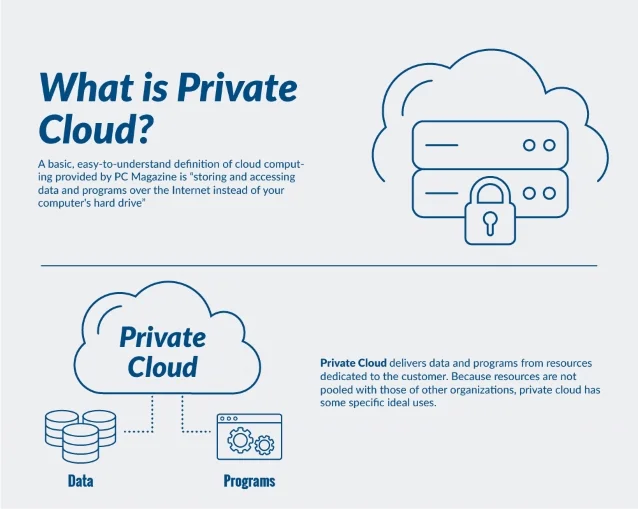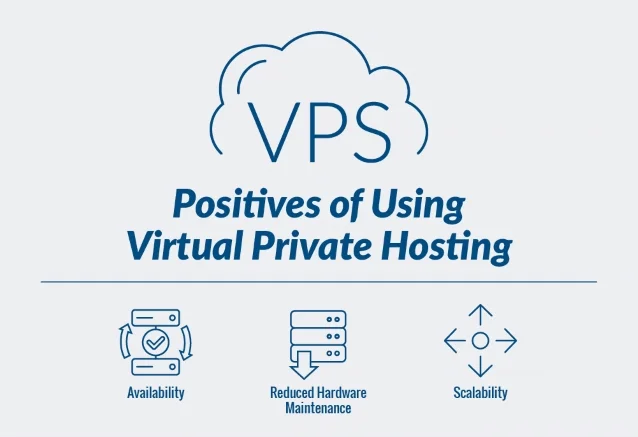What Is Private Cloud?
This is different from a public cloud, where services are shared among multiple customers of the cloud vendor. In a private cloud, the underlying hardware layer is segregated from other clients' infrastructure, providing isolated access to all resources for a single customer.
Advantages of Private Cloud Hosting
Private cloud hosting services can offer many advantages, including:
- Availability: Guaranteed access to resources in the event of a local outage
- Scalability: High-demand scalability options
- Resources: More resources than other options
- Support: A support team is available
- Management: The service provider can manage cloud resources, including maintenance, upgrades, and security management
Deployment of Private Cloud
Private clouds can be hosted in several ways, including:
- On-premises: Hosted in the customer's data center
- Independent cloud provider: Hosted on the infrastructure of an independent cloud provider
- Rented infrastructure: Built on rented infrastructure in an offsite data center
- Virtual hosting: Provides cloud functionality without setting up physically redundant servers

What is the Difference Between Private and Public Cloud?
What are Public Clouds?
Public clouds are environments where resources and services are made available to multiple clients over the Internet. Unlike private clouds, public clouds are owned and operated by third-party cloud service providers, such as Atlantic.Net, Amazon Web Services (AWS), Microsoft Azure, and Google Cloud. These providers manage and maintain the infrastructure, allowing customers to access computing resources on a pay-as-you-go basis.
Public clouds offer high scalability and flexibility, with resources being dynamically allocated as needed. However, because resources are shared among many users, there can be concerns about data privacy and compliance, making them less suitable for sensitive data or mission-critical applications.
What are Private Clouds?
Private clouds are typically utilized by companies with sensitive data, management, or workload demands beyond those practical for a shared environment. In the early days of private cloud, some organizations chose to host a private cloud on-premises. The benefits of private cloud are maximized when the organization leverages the data center resources of a reliable cloud provider, like Atlantic.Net. This removes the responsibility of providing and maintaining critical redundant systems like cooling, power, networking, storage, and infrastructure that normally lie far outside the core competency of most companies.
The Advantages of Private Cloud Hosting
Scalability: While dedicated private hosting requires the purchase of additional hardware, adding a server or memory space can be done instantaneously with a VPS as long as there is space on the computer to configure additional virtual servers.
Resources: Clients have dedicated access to more computing resources than in typical on-premises setups, ensuring that the performance and availability are not impacted by other users. The cloud’s isolation provides a consistent and predictable environment, suitable for workloads requiring steady performance. Clients can also customize their resource allocation.
Support: Private cloud hosting typically includes dedicated support from the service provider, which can be crucial for maintaining the environment and troubleshooting issues. This support often extends beyond basic technical assistance to include strategic guidance on optimizing cloud usage, security best practices, and compliance management.
Management: Management services in private cloud hosting often include monitoring, maintenance, updates, and security. The cloud provider handles routine tasks such as patching software, upgrading hardware, and managing backups, allowing organizations to focus on their core business activities.
Private Cloud Hosting Models
Private cloud can be deployed in a variety of ways, to include:
- Private Hosting On-Premises
- Private Hosting with an Independent Cloud Provider
- Private Hosting on Rented Infrastructure
- Virtual Private Hosting (VPS Hosting)
- Atlantic.Net’s Private Cloud
Private Hosting On-Premises
Private hosting is a hosting arrangement such that an organization’s infrastructure, databases, and servers all exist in an exclusive location inaccessible to anyone outside the company or the private hosting provider. This type of hosting is often used by large companies in need of enterprise-grade functionality.
In the early days of the Internet, private hosting was done completely on-site for big companies. They would invest in servers housed in the organizations’ headquarters or a private data center.
Private Hosting with an Independent Cloud Provider
Private hosting with an independent cloud provider involves utilizing the provider's infrastructure to host a company's dedicated cloud environment. This setup allows organizations to benefit from the provider's expertise in managing data centers, networking, and security while maintaining control over their data and applications.
Independent providers often offer flexible options for customization and can tailor the infrastructure to meet specific business requirements. This model is particularly beneficial for organizations that need the reliability and scalability of a cloud environment without the complexities of managing physical hardware.
Private Hosting on Rented Infrastructure
Private hosting on rented infrastructure involves leasing servers and other hardware from a third-party data center, rather than purchasing and maintaining them outright. This model offers the benefits of private cloud hosting, such as dedicated resources and enhanced security, without the capital expenditure associated with buying and housing hardware. The hosting provider typically manages the physical infrastructure, while the client retains control over the software and applications running on it.
This approach differs from traditional private hosting with a cloud provider in that the rented infrastructure often includes a broader range of services, such as managed IT support, network management, and storage solutions. Companies can customize their environment to fit their specific needs, with the flexibility to expand or contract resources as required. Additionally, this model provides a middle ground between fully on-premises solutions and fully outsourced cloud services.
Virtual Private Hosting (VPS Hosting)
In the 2000s, improvements in software and hardware capabilities led to the development of the virtual private server (VPS). VPS technology allows software called a “hypervisor” to use the physical hardware of a server, such as memory, CPU and networking capabilities. Each virtual server acts like a normal operating system with its own applications, email software, Internet browsing capabilities, etc. Each user has his or her own unique user ID, password, and authentication code to sign on with.
For an example of the benefits of VPS Hosting, consider a company with offices in different parts of the world. Say a chemical news bureau is headquartered in London but also has other offices in world energy hub cities such as Houston and Shanghai. Rather than redundantly set up the Texas and China offices with all of the same hardware and servers in London, a VPS hosting solution is established. A virtual server powered in the UK allows users in Houston and Shanghai to log on through a virtual server and see the exact same desktop and shared file servers as their colleagues in London.
Atlantic.Net’s Private Cloud
The dedicated infrastructure of Atlantic.Net’s Private Cloud solutions allow the highest degree of visibility and control of any cloud environment, ultimately providing the peace of mind your company expects and deserves. Having dedicated resources also guarantees they will be available when they are needed, making planning easier than in a public cloud model in which a “noisy neighbour” could take up resources, potentially impacting other users in the cloud.
Because new resources can be spun up and spun down as needed, Atlantic.Net’s Private Cloud retains much of the scalability and elasticity of a public cloud. It is also similarly resilient because the virtualized server workload can be redistributed to different pieces of hardware in the event of a failure.
Private Cloud Setups Available From Atlantic.Net
There are several setups available for Atlantic.Net’s Private Cloud solutions, each defined by the hypervisor controlling them:
Hyper-V
Microsoft Hyper-V is a popular hypervisor (virtual machine manager) that is strategically suited for those primarily using Windows Servers. Those who do so may already be comfortable with its interface and features, like Windows Active Directory, which Hyper-V uses for access control in certain circumstances. It also comes loaded with many features that enable easy maintenance, security, backups, and live migration..
Hyper-V can also be deployed as a “bare metal” hypervisor, meaning it does not run on an underlying operating system. Accessing hardware resources directly provides better performance, scalability, and stability.
KVM
Kernel-based Virtual Machine (KVM) is an open source hypervisor for the Linux operating system, as opposed to a bare metal hypervisor. While it is bundled with Linux, KVM supports running a wide variety of operating systems as “guests,” including Windows. One of the most-widely used cloud hypervisors in the world, KVM is touted as providing a low-cost alternative without sacrificing performance, scalability, or security.
VMware
VMware vSphere is a popular enterprise platform for deploying and managing private cloud. It is designed to run VMware's ESXi bare metal hypervisor. While vSphere is designed to work with other VMware cloud and virtualization products, it also supports Hyper-V and KVM based virtual machines. vSphere ESXi trades some of the flexibility and features of Hyper-V for a smaller footprint and more simplicity, which contribute to its strong security and ease of use.

Conclusion
The decision to run a private cloud, and the choice of which kind of private cloud technologies to use should be made based on the needs of your organization. If your company needs custom provisioning and automation, security, and a greater degree of control and flexibility, you will achieve the greatest benefit from deploying a private cloud.
How Can Atlantic.Net Help?
Atlantic.Net’s Private Cloud Solutions are especially ideal for companies in the healthcare, payment, telecommunication, and web hosting industries, as well as businesses with rapidly increasing infrastructure needs.
Whatever kind of Cloud is right for your organization, successfully delivering its benefits to your business and its customers requires starting with a realistic plan, following that plan, and partnering with the right service provider. Atlantic.Net has over thirty years of experience, with expert staff that are available to assist you and your company’s needs 24/7. Contact us today, and we will work with you to create a custom Private Cloud Solution that is perfect for your business.
Our plans are designed to provide maximum flexibility to business as well as developers. Please contact us via email at [email protected] or via phone at 888-618-3282 . Our team would be happy to guide you towards the solution that is ideal for your business needs.
Award-Winning Hosting Solutions & Services
Simple, Fast, Reliable Server Hosting
Share Your Vision With Us
And We Will Develop a Hosting Environment Tailored to Your Needs!
Contact an advisor at 866-618-DATA (3282), email [email protected], or fill out the form below.
Don't just take our word for it: Cyber Defense Magazine recognized Atlantic.Net as "Most Innovative Cloud Hosting Provider" in the 2024 Global Infosec Awards.